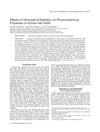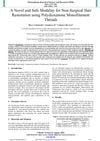 9 citations,
July 1992 in “Clinics in Dermatology”
9 citations,
July 1992 in “Clinics in Dermatology” Scalp reduction surgery can effectively treat male pattern baldness when tailored to the patient and performed with care to minimize complications.
 8 citations,
September 2008 in “Medical Hypotheses”
8 citations,
September 2008 in “Medical Hypotheses” The paper suggests that hair loss might be caused by skull growth, not just DHT's effect on hair follicles, and calls for more research.
 5 citations,
March 2012 in “Microscopy Research and Technique”
5 citations,
March 2012 in “Microscopy Research and Technique” UVB radiation changes the chemical makeup and dries out human hair but doesn't alter its appearance or texture.
 3 citations,
April 1982 in “Clinics in Plastic Surgery”
3 citations,
April 1982 in “Clinics in Plastic Surgery” Scalp reduction can effectively treat male pattern baldness, with most patients satisfied and few complications.
 June 2023 in “Research Square (Research Square)”
June 2023 in “Research Square (Research Square)” Sky Fruit Seed Crush can preserve goatskin with less environmental impact than traditional methods.
 37 citations,
January 2017 in “International Journal of Dermatology”
37 citations,
January 2017 in “International Journal of Dermatology” Trichoscopy helps tell apart alopecia areata and trichotillomania in Asians by looking at specific hair and scalp features.
 10 citations,
December 2020 in “Dermatologic Therapy”
10 citations,
December 2020 in “Dermatologic Therapy” Minoxidil and spironolactone combo effectively treats androgenetic alopecia, improving hair density and diameter.
 10 citations,
May 2018 in “Forensic Science International”
10 citations,
May 2018 in “Forensic Science International” Shrunken heads retain some facial features and hair characteristics, allowing for limited individual identification.
 3 citations,
July 2019 in “International journal of scientific research in science and technology”
3 citations,
July 2019 in “International journal of scientific research in science and technology” Herbal hair gel with fenugreek seed extract was found to increase hair growth.
 November 2001 in “Dermatologic Surgery”
November 2001 in “Dermatologic Surgery” Galea fixation is a safe and effective way to remove bald scalp with minimal scarring and reduced stretch-back.
488 citations,
July 2021 in “Cell” Fibroblasts are crucial for tissue repair and inflammation, and understanding them can help treat fibrotic diseases.
 4 citations,
December 2023 in “Advanced science”
4 citations,
December 2023 in “Advanced science” New injectable hydrogels with gelatin, metal, and tea polyphenols help heal diabetic wounds faster by controlling infection, improving blood vessel growth, and managing oxidative stress.
3 citations,
December 2021 in “Frontiers in Pharmacology” Ficus benghalensis leaf extracts can effectively promote hair growth and inhibit hair loss.
2 citations,
December 2021 in “Pharmaceutics” Finasteride-loaded proniosomes effectively promote hair growth in mice.
24 citations,
September 2020 in “Pharmaceutics” Lidocaine-loaded microparticles effectively relieve pain and fight bacteria in wounds.
1 citations,
November 2023 in “Life” Hyaluronic acid injections can improve mouth opening and quality of life in scleroderma patients.
 1 citations,
November 2023 in “Journal of cosmetic dermatology”
1 citations,
November 2023 in “Journal of cosmetic dermatology” The new anti-dandruff shampoo with ketoconazole-coated zinc oxide nanoparticles is more effective against dandruff.
 November 2024 in “International Journal of Molecular Sciences”
November 2024 in “International Journal of Molecular Sciences” Nanoparticles may improve caffeine delivery for hair growth, offering a potential alternative to minoxidil for hair loss treatment.
34 citations,
September 2020 in “Clinical, cosmetic and investigational dermatology” Hyaluronic acid increases collagen synthesis safely, while poly-L-lactic acid may cause complications by affecting fibroblasts.
 2 citations,
November 2023 in “Bioactive materials”
2 citations,
November 2023 in “Bioactive materials” New method improves copper peptide delivery for hair growth three times better than current options.
 1 citations,
May 2022 in “IntechOpen eBooks”
1 citations,
May 2022 in “IntechOpen eBooks” Obesity leads to physical, metabolic, reproductive issues, higher healthcare costs, and mental health problems.
 October 2023 in “Bioactive Materials”
October 2023 in “Bioactive Materials” The new hair loss treatment combining nitric oxide and minoxidil in a special carrier is effective for hair regrowth.
 April 2023 in “IntechOpen eBooks”
April 2023 in “IntechOpen eBooks” Neuropathic pruritus is a commonly overlooked and wrongly diagnosed type of chronic itching that is hard to treat.
 21 citations,
March 2017 in “Skin research and technology”
21 citations,
March 2017 in “Skin research and technology” Removing external lipids from hair reduces moisture and increases strength, while removing internal lipids decreases water permeability.
 12 citations,
February 2019 in “Skin research and technology”
12 citations,
February 2019 in “Skin research and technology” White hair has less lipid content and absorbs water differently than brown hair.
 April 2018 in “The journal of investigative dermatology/Journal of investigative dermatology”
April 2018 in “The journal of investigative dermatology/Journal of investigative dermatology” Aging causes changes in scalp cells that can negatively affect hair health.
 12 citations,
January 2007 in “Current problems in dermatology”
12 citations,
January 2007 in “Current problems in dermatology” Environmental and cosmetic factors, including heat, chemicals, and sun exposure, can cause hair loss and damage.
 10 citations,
November 2015 in “Elsevier eBooks”
10 citations,
November 2015 in “Elsevier eBooks” Modern wound dressings like hydrocolloids, alginates, and hydrogels improve healing and are cost-effective.
 13 citations,
December 2010 in “Archives of Dermatology”
13 citations,
December 2010 in “Archives of Dermatology” Minoxidil use can cause trichostasis spinulosa in long-term hair loss patients.
 August 2024 in “International Journal of Science and Research (IJSR)”
August 2024 in “International Journal of Science and Research (IJSR)” PDO threads are effective and safe for non-surgical hair restoration.
























